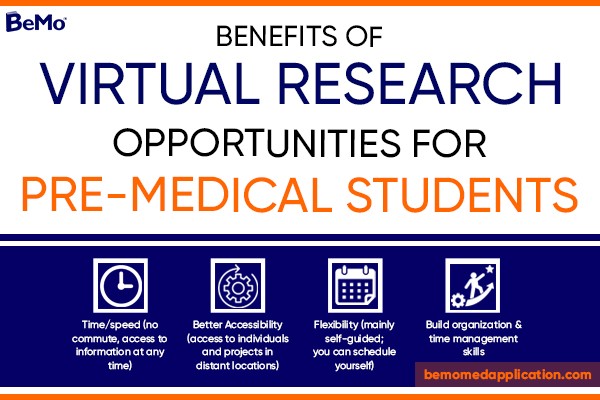Virtual research opportunities for premed students are becoming increasingly popular. They allow you to develop essential skills and strengthen your medical school applications while being more flexible than some of the traditional research opportunities that you have to compete for during your undergraduate studies. In this blog, we'll tell you everything you need to know about virtual research opportunities, including what they actually entail, their benefits and drawbacks, where you can find premed research opportunities, and how to find quality research activities.
>>Want us to help you get accepted? Schedule a free initial consultation here <<
Listen to the blog!
What Are Virtual Research Opportunities? Are They Valid?
Just as a virtual medical school interview has many of the same components as a traditional interview, virtual research opportunities allow students to pursue research aligned with their personal academic interests online, under the guidance of experts, without taking place in a traditional lab setting.
These virtual research experiences can be just as beneficial as in-person lab work, offering the same skills development in scientific methodology, data analysis, the opportunity to present and publish findings, and access to mentors who can write your medical school letters of recommendation. Depending on the project, virtual research can even offer unique advantages, such as flexibility and access to a broader range of topics.
Virtual research can take on a number of forms, such as: data analysis and cleaning, transcription, virtual interviews or data collection, literature reviews, and more!
Medical schools value diverse research experiences, recognizing the wide-ranging skills they cultivate in future physicians. The type of research you gain for medical school doesn't necessarily have to be limited to "wet lab" life sciences work. All research experiences, both virtual and non, can still be added to your AMCAS Work and Activities section.
Check out this infographic about the benefits of virtual research experience:
Virtual Research Opportunities: Pros and Cons for Premed Students
As with everything, there are benefits and drawbacks to virtual research programs. Let’s take a look at some of those pros and cons:
Virtual research opportunities for premedical students give students a chance to select topics for independent research or participate in projects that may not be available to them in their local community. They get access to a wider variety of topics and experts to guide them through the process. It is not uncommon for premedical students to have trouble finding research opportunities simply because they can't get a professor to agree to be their supervisor. Virtual research programs give these students access to other professionals online who can supervise and provide additional support.
Where to Find Virtual Research Opportunities as a Premed Student
Securing research opportunities as a premed student can be challenging, especially with limited lab positions and intense competition. Many undergraduate students struggle to find a starting point, and those who do often face stiff competition for the few available lab spots in their community.
Unlike physical labs that have space and resource constraints, virtual research programs can accommodate more students, allowing a broader range of projects to be pursued without the same limitations.
While there are many positions available, it can be hard to find these without prior knowledge and to figure out if a source is legitimate or not. So here are three ways to look for virtual research opportunities:
1. Online
Virtual research programs take place online, so it is only fitting that you should start there when looking for such an opportunity. Several universities, colleges, individuals, and academic companies offer virtual research opportunities, and they will often have this information available for review on their websites.
For example, the AAMC has a list of summer undergraduate research programs on their website and some of them are virtual. A few qualified academic consulting firms also offer virtual research programs, and we here at BeMo offer a virtual premed research program.
Our experts help you choose from the many research topics that we have by helping you figure out which topic would be best for your candidacy while allowing you to follow your own academic interests.
Our research program includes guided workshops that teach students about methodology, literature search, data analysis, research manuscript creation, scientific communication, and research presentation. This means that you not only get the chance to grow your skills and improve yourmedical school CV and application, but you also get to learn other skills that will be valuable to you in medical school and beyond.
Looking for more details on how to get the best research experience as a premed? This video is for you:
2. Colleges and Universities
Not all universities offer virtual research programs, but many more are starting to. For example, the University of Illinois in Chicago has a Summer Research Opportunities Program that aims to introduce sophomores and juniors to academic research experiences. We recommend that you speak with your TAs and professors to inquire directly about projects they might be working on, or you can propose specific research ideas if you have any.
Your university also likely has a job or internship opportunities board that you can access as student. The benefit here is that sometimes these postings are restricted to students at your school, so there is less competition.
However, we recommend that you do not limit yourself to the school you are currently attending. You can choose to take on a research project from a different university during the summer, during a gap year before medical school or even during the school year if it is a possibility for you. Several universities have virtual research programs that are open to students who are not enrolled in their undergraduate programs. For example, Baylor College of Medicine has the Summer Undergraduate Research Training (SMART) Program that is designed to give foundational research experience to undergraduate students who are interested in pursuing medical research.
3. Leverage Your Network
Even though these research programs happen online, they are run by real people. Often, by experts in their respective fields who are connected to other professionals in that field. So, talk to the people around you and tell them precisely what you are looking for.
Speak with your friends and family, instructors and professors, colleagues and supervisors, and anyone else in your circle who may have connections to the medical field. One or several of them might know of an opportunity that could interest you.
Remember, research experience doesn’t have to be directly connected to medicine either. Many research programs will help you build essential skills like critical thinking or communication, even if they aren’t clinical research opportunities.
Need help writing a research assistant cover letter? This video will walk you through:
Tips on How to Find the Best Virtual Research Opportunities
- Evaluate the Source of the Program: The credibility and expertise of those offering the virtual research opportunity are crucial. Ensure that the program is led by qualified professionals, such as experienced researchers or medical experts, who have a proven track record in mentoring students. Working under the guidance of individuals who are well-versed in research methodologies and medical science ensures that you gain meaningful insights and develop strong research skills.
- Assess the Value of the Research Experience: Quality trumps quantity when it comes to experiences on your medical school application. Look for research opportunities that offer comprehensive learning experiences, including workshops, webinars, and hands-on exercises that teach you key aspects of research methodology, literature review, scientific communication, and presentation skills. Avoid programs that provide minimal guidance or supervision. Instead, prioritize opportunities that allow you to explore impactful and relevant topics, which will enhance your understanding of the research process and make your medical school application stand out!
- Consider the Time Commitment: As a premed student, balancing your academic workload, MCAT studying, and extracurricular activities can be challenging. It’s important to choose a virtual research program that fits into your schedule without overwhelming you. Look for flexible programs that allow you to start at your convenience and complete projects within a reasonable timeframe.
FAQs
1. What does virtual research mean?
Simply put, virtual research programs are guided research programs that happen online. They are typically offered by universities and academic consulting companies.
2. Do I need research experience to get into medical school?
How important is research for medical school? Research experience is not a formal requirement for most medical schools, but it is an experience that most medical school applicants have on their resume nowadays. This means that if you want to be a competitive applicant at a top school, having some research experience is necessary.
3. What kind of research should premed students get?
Medical school committees value different kinds of research and this will depend on the school or program you are applying to. There is no right kind of research but there are better research opportunities for certain situations, for example some schools value laboratory research more while others might be looking for community-based research programs.
4. Can premed students conduct social science or liberal arts research?
Absolutely! Research in different fields of study will still give you valuable experience and teach you highly transferable skills.
5. Where can I find virtual research opportunities as a premed student?
You can find them online, on academic consulting websites like this one, and by speaking with your teachers and school advisors.
6. Does BeMo offer virtual research opportunities for pre-medical students?
Yes, we do. We offer students the opportunity to work with our research experts on high impact research projects that can help your medical school application stand out. Book your free consultation today if you want to learn more about these opportunities.
7. Does premed research experience need to include lab work?
No! Research experience can still be valuable even if it is not conducted in a lab or clinical environment.
8. Will having virtual research experience increase my chances of getting into medical school?
Research experience gives you an opportunity to enhance your medical school resume and make yourself a more competitive candidate. That can definitely improve your chances of getting into the medical school of your choice!

